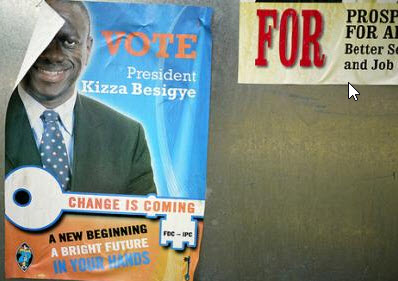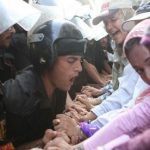With uncertainty surrounding Museveni’s plans, there are a number of candidates who could take over Uganda’s presidency.
By Risdel Kasasira

Kampala, Uganda:
Back in 2001, during a hotly contested presidential race, Ugandan President Yoweri Museveni told voters that, if re-elected, this would be his final term and urged the electorate to support him one last time.
In that election, Museveni was, for the first time, facing a strong opponent in Kizza Besigye who ran against the president again in 2006 and 2011. Over the past decade, Besigye has been Uganda’s central opposition symbol and figurehead, redefining Uganda’s political landscape and drawing a faction of Museveni allies to his own ranks. Meanwhile, President Museveni’s popular support is declining.
However, while recent surveys suggest that many do not support Museveni’s ‘Project 2016’ re-election bid, they also suggest that Besigye is not necessarily the first choice for his replacement.
Museveni vs. Besigye
Museveni and Besigye have been political rivals for over a decade, but their history together stretches further back than that. Besigye served as Museveni’s personal physician in the National Resistance Army (NRA), and after the group’s ascent to power in 1986 held ministerial appointments in the National Resistance Movement (NRM) government. In 1989, Besigye re-joined the army, first as a battalion commander, then as the chief of logistics and engineering. This firsthand knowledge of military deals made him cynical about NRM leadership, particularly where military procurement was concerned.
In 1998, he applied to leave the army after publicly criticising top figures in the military and government. But the fallout between the two men started in earnest in 1999 when, still serving as an army officer, Besigye authored a dossier attacking Museveni’s regime for “losing track” of the original ideals of the NRA’s bush war. He cited corruption, nepotism, and other undemocratic tendencies. The army threatened to court-martial Besigye, but he escaped punishment with a hurried retirement.
In a move that is said to have taken even Museveni by surprise, Besigye soon after announced that he would stand against his former boss, promising to reform Ugandan politics. Since then he has lost three times in president elections, including in 2006 after Museveni had removed presidential term limits allowing him to run again.
Over this time, some Ugandans think the contest between Museveni and Besigye has degenerated into an obstructive personal rivalry, long since ceasing to be a political contest. If this about politics, “there would be different faces on Uganda’s political scene”, Ndebesa Mwambutsya, a political history lecturer at Makerere University, explained to Think Africa Press, “It wouldn’t be Museveni versus Besigye”.
More Museveni?
After 26 years of Museveni rule, the voices within the ruling party urging him to retire in 2016, before the next election, are growing louder. But his loyalists are singing a different song, and some of his lieutenants seem to be paving the way for him to run again.
However, Museveni’s re-election would not be easy this time round. Civil societies, especially religious leaders, are calling for an end to Museveni’s prolonged rule and for the reinstatement of presidential term limits. Museveni has responded by telling religious figures to told “mind their business” and leave politics alone, but retired Assistant Bishop of Kampala, Zac Niringiye insisted to Think Africa Press that it is their right to discuss the political future of Uganda. “We want him to retire peacefully”, Niringiye explained. “We don’t hate him. We are telling him to retire honourably.”
Debate and uncertainty surrounding Museveni’s succession has also bred internal fighting within the NRM and the president may faces challenges from within. The NRM seems increasingly dominated by a newer generation of members interested in political change and a group of young NRM legislators has threatened to break away and form a new political party.
Challengers within the party
There are also a number of groups in the ruling party with favoured candidates for the presidency in mind. Until a recent falling out, Prime Minister Amama Mbabazi had been widely perceived as Museveni’s most likely successor, and there is a prominent pro-Mbabazi camp within the NRM. But since Museveni seemed to want to run again, this faction has become quieter, realising a battle against Museveni would be one they would be unlikely to win.
The prime minister’s biggest undoing has been his public image. He is seen as aloof, arrogant and is accused within NRM circles of being a plotter. He has also allegedly been involved in many corruption scandals, and been accused of misusing his influence in a land deal worth 11 billion Ugandan shillings ($5.5 million). An even more dramatic corruption case almost saw him censured by parliament for allegedly misusing money meant for security gadgets during a Commonwealth Heads of Government Meeting in Kampala in 2007.
Mbabazi’s current silence may however be a tactical withdrawal, and the NRM should not be surprised if he reignites his intention to contest for the highest office in the country in a few years’ time.
Another possible contender for the presidency is First Lady and Minister of Karamoja Affairs, Janet Museveni. However, even if Museveni retired in 2016, the transition of power from husband to wife would probably be seen as an intolerably crass monopolisation of power within one family.
Another candidate could be Speaker of Parliament Rebecca Kadaga whose popularity is rising not only within the ruling party, but even amongst opposition. A number of women activists praise her for her impartiality while presiding over the national parliament.
Public opinion divided
But what does the electorate think? A survey conducted by Research World International in 2011 and released in May 2012 indicates that 55.6% of respondents belonging do not want Museveni to run again. On Besigye, 45% said he should stand again while 43% opposed the idea.
Asking NRM supporters who the next leader of the NRM should be, 13.8% favoured the First Lady, 13% former vice-president Gilbert Bukenya, 11.5% Kadaga and 8% favoured Mbabazi. Amongst all respondents (NRM and non-NRM supporters alike), however, the most favoured presidential candidate was Kadaga.
The 2016 elections are still a long way away and a lot could change in that time. However, if internal divisions within the NRM deepen into pronounced factions, the party’s ability to compete at the elections may be significantly weakened. In this instance, the downfall of Museveni and the NRM would not have been the work of Besigye and the opposition over several hard-fought years, but the result of intrigue and mudslinging within the ruling party itself.

